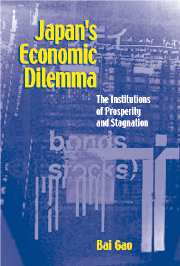Book contents
- Frontmatter
- Contents
- Acknowledgments
- 1 Introduction
- 2 Three Theoretical Issues
- 3 The Rise of the Principles of Coordination and Stability
- 4 Coordination, Excessive Competition, and High-Speed Economic Growth
- 5 Stability, Total Employment, and the Welfare Society
- 6 The Roads to the Bubble
- 7 The Struggle of the Welfare Society
- 8 Fighting the Stagnation
- References
- Index
2 - Three Theoretical Issues
Published online by Cambridge University Press: 07 January 2010
- Frontmatter
- Contents
- Acknowledgments
- 1 Introduction
- 2 Three Theoretical Issues
- 3 The Rise of the Principles of Coordination and Stability
- 4 Coordination, Excessive Competition, and High-Speed Economic Growth
- 5 Stability, Total Employment, and the Welfare Society
- 6 The Roads to the Bubble
- 7 The Struggle of the Welfare Society
- 8 Fighting the Stagnation
- References
- Index
Summary
In this chapter, I elaborate on the three theoretical issues presented in Chapter 1. I argue first that globalization is an institutional process. The two structural shifts described in Chapter 1 – the expansion of trade and production and the efforts for social protection in the 1950s and the 1960s, and the later shifts toward the expansion of finance and monetary activity and toward the release of market forces – were driven by the rise and fall of the Bretton Woods system in conjunction with important changes in the GATT. Second, I argue that changes in the international economic order led to the malfunction of the Japanese economic system, which had suffered from two dilemmas: the dilemma between strong coordination and weak control and monitoring of corporations, and the dilemma between the system's high stability and its low capacity for elevating the economic structure.
THE INSTITUTIONAL PROCESS OF GLOBALIZATION AND THE TWO STRUCTURAL SHIFTS
The process that has come to be called globalization is often measured by production factors, such as capital, goods, technology, and even the labor force (in the form of immigration). Both sides in the debate on globalization, moreover, often use the ratio of international trade against the world GDP to make their points: Those who favor globalization emphasize the rapid increase of this ratio, from 6 percent in 1953 to 9 percent in 1971 and 15 percent in the mid 1990s. In contrast, those who do not favor globalization focus on a comparison between the two peaks in the movement of the ratio between 1913 and 1995.
- Type
- Chapter
- Information
- Japan's Economic DilemmaThe Institutional Origins of Prosperity and Stagnation, pp. 22 - 47Publisher: Cambridge University PressPrint publication year: 2001



